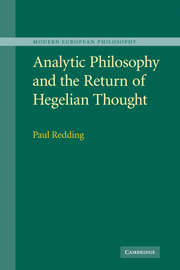Book contents
- Frontmatter
- Contents
- Acknowledgements
- Introduction: analytic philosophy and the fall and rise of the Kant–Hegel tradition
- 1 McDowell, Sellars and the myth of the perceptually given
- 2 Brandom, Sellars and the myth of the logical given
- 3 Individuation and determinate negation in Kant and Hegel
- 4 The Kantian route to Hegel's inferentialism
- 5 Aristotelian Phronesis and the perceptual discernment of value
- 6 Kant, Hegel and the dynamics of evaluative reason
- 7 Hegel and contradiction
- 8 Hegel, analytic philosophy and the question of metaphysics
- Bibliography
- Index
7 - Hegel and contradiction
Published online by Cambridge University Press: 22 September 2009
- Frontmatter
- Contents
- Acknowledgements
- Introduction: analytic philosophy and the fall and rise of the Kant–Hegel tradition
- 1 McDowell, Sellars and the myth of the perceptually given
- 2 Brandom, Sellars and the myth of the logical given
- 3 Individuation and determinate negation in Kant and Hegel
- 4 The Kantian route to Hegel's inferentialism
- 5 Aristotelian Phronesis and the perceptual discernment of value
- 6 Kant, Hegel and the dynamics of evaluative reason
- 7 Hegel and contradiction
- 8 Hegel, analytic philosophy and the question of metaphysics
- Bibliography
- Index
Summary
One of Hegel's constant complaints about the type of cognition characteristic of the Understanding is its static, mechanical and lifeless nature which he contrasts to the much more organic and dialectical form of thinking of ‘Reason’, and notoriously he here appeals to ‘contradiction’ to capture the vitality of genuine thought. In the history of logic, what is appropriately called the ‘law of non-contradiction’ is commonly called ‘the law of contradiction’, but when Hegel appeals to his ‘law of contradiction’, the title is apt. The law that Hegel calls ‘the law of contradiction’ states that ‘everything is inherently contradictory’. It is a law, Hegel says, that expresses the ‘truth and the essential nature of things’.
Brandom, like a number of other defenders of Hegel before him, claims that this thesis does not entail the denial of the law of non-contradiction. Quite the contrary, Hegel ‘radicalizes it’, he says, ‘and places it at the very center of his thought’. Of course, those philosophers who have claimed that with his ‘law of contradiction’ Hegel does actually deny the law of non-contradiction have for the most part regarded this as amounting to a type of reductio of his philosophy. Like Aristotle, they regard the law of non-contradiction as the most fundamental and inviolable truth that is known, a truth on which all other truths are dependent. Not all defenders of Hegel have been as sanguine about the law of non-contradiction, however.
- Type
- Chapter
- Information
- Analytic Philosophy and the Return of Hegelian Thought , pp. 200 - 219Publisher: Cambridge University PressPrint publication year: 2007



